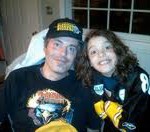I’m in touch with a lot of people about health issues. I continue to be amazed by the range of needs that people have, and how hard it is to meet them. But some of the issues that come to my attention strike me as so simple as to be true no brainers. I want to write here about two examples, one from the ALS world, and the other from breast cancer. I will be interested to read what readers of this blog see as other issues in health that can be easily solved, but, tragically, are not.
Donating Sick Time for A Cop with ALS
The township of Greenwich, Connecticut has a Collective Bargaining Agreement (CBA) with  its police force. Under the terms of that agreement, police officers are allowed to donate some of their accumulated sick time to help other officers who are ill but have used up their sick time. Roger Petrone, a Sergeant in the Greenwich police department, was diagnosed with ALS at the age of 37 in 2007. This year, as Sgt. Petrone was about to deplete his remaining sick time, he sought to use time donated by his colleagues under the terms of the CBA. The Township took the position that, despite the terms of the CBA, Sgt. Petrone would have to retire and be left to his own financial resources as he struggles with ALS.
its police force. Under the terms of that agreement, police officers are allowed to donate some of their accumulated sick time to help other officers who are ill but have used up their sick time. Roger Petrone, a Sergeant in the Greenwich police department, was diagnosed with ALS at the age of 37 in 2007. This year, as Sgt. Petrone was about to deplete his remaining sick time, he sought to use time donated by his colleagues under the terms of the CBA. The Township took the position that, despite the terms of the CBA, Sgt. Petrone would have to retire and be left to his own financial resources as he struggles with ALS.
Under pressure from his colleagues in the police department and from the ALS
community, Sgt. Petrone won his battle with the Township. The Selectmen backed down on their threat to deprive the Sergeant of his rights under the CBA.
My question is why it should be so hard, when the rules, as they often do, allow people to use sick time donated by their colleagues for people to take advantage of them? While there may be issues that need to be anticipated with donated sick time programs, many institutions have done so successfully. Just google “donated sick time programs” and you’ll see what I mean.
When people are sick, it shouldn’t be so hard to get the kind of help to which adopted work rules entitle you, should it?
Space for a Support Group for Women With Metastatic Breast Cancer
At the end of October, Nancy Brinker of the Susan G. Komen for the Cure Foundation gave
one of her classic defenses of all things pink by pointing out that more pink is needed as long as women are too poor to afford both housing and breast cancer treatment, or have to choose between spending money on bus fare to get to treatment or feeding their families. Ms. Brinker overlooked two things in her analysis. The first is that the women she describes don’t need pink, they need money. And the second and more telling thing she overlooked is that her organization, the richest breast cancer organization in the world, doesn’t give funds to the very women she describes or do much to address the challenges these women have.
There’s group of patients with metastatic breast cancer who meet for support in Austin, Texas, not far from Komen’s headquarters in Dallas. The group, called the IV League,  meets once a month, and needed funding for rent for a space for their meeting. We’re not talking big bucks here. But the Komen Foundation refused to fund the need.
meets once a month, and needed funding for rent for a space for their meeting. We’re not talking big bucks here. But the Komen Foundation refused to fund the need.
If Komen really cares about breast cancer and about the needs of women with metastatic disease, they could fund the IV League’s rent out of petty cash. Really, this shouldn’t be hard. Why is it?
Other examples?
I’m sure there are tons of examples in health care of things that should be simple but aren’t. What are your favorites? And have you seen any solutions that address them? I invite you to post responses here for everyone to see.
© Barbara A. Brenner 2011



That Komen example you cite is shocking! Is there a place where other folks who have been spurned by Komen can broadcast their rejection?
The best place to broadcast comments on Komen is Komen Watch, I think.
Other areas would be the:
Veteran’s Administration for military dx with ALS and how the lack of continuity of procedure/process for effectively & efficiently sharing information and handling claims. We hear about this over and over and over again.
Social Security Admin: ALS is to be fast tracked …. yet there doesn’t seem to be anything really ‘fast’ in the scheme of things other than the person dx with ALS and the speed in which it robs them of everything …. physically, emotionally, economically, socially…..
Too often, the nuggets of valuable information for those in need seem to be buried deep. What could easily be communicated and shared is achieved only after a lengthly process riddled with humiliation for the person in need of.
I got Social Security Disability coverage very quickly once I filled out the application. Did others have a different experience?
This is a link to one story regarding a Veteran who died while waiting on benefits ….. totally avoidable!!
http://www.king5.com/news/investigators/Veteran-dies-waiting-for-benefits—-133338928.html
It is a constant surprise to me how unkind people can be…..and how they will walk past one another…..it does not say much for humans….why and how can those stories be okay, how can people think like that/act like that? I do not know. a
It may be just our good luck to have an extraordinary ALSA chapter here as well as our two VA hospitals in the Tampa area. Our care coordinators know the ropes on most of the benefits available and are quick to offer their help to PALS/CALS. Maybe it’s due to the inclusion of PALS on the board and all committees. We help keep the patients in focus.
I’m not a veteran but have met many during my 5 years of attending our support group. I can’t think of any of them who fail to tell of the fbine way their cases have been handled by both of our local VA hospitals here. We are fortunate to have some of the techs make presentations to our group and offer telephone help to us that are not veterans.
So while I know this not the case everywhere but it is good to be able to share some good news.
To Chuck, Always happy that you continue to reap great rewards from your geographical location and proximity to quality care. You are the ray of sunshine!! Your great experience is pinnacle to where many of the experienced injustices and problems commence. Dating back to the 1990s of Quality Assurance, Continuous Improvement, and Customer Service identifying and creating a model that is tried & true and works ….. could be easily achieved across all ALSA chapters & VA offices. The “stove pipe” way of doing business does not belong in a non-profit business model nor the VA. All processes & procedures should be created equal within organizations like ALSA & the VA. There should be no variations or deviations from one chapter to the next or one VA office to another.
Technology exists today to quite easily simplify the process of dealing with a person who has a particular diagnosis. You enter the diagnosis or description (ie ALS, Breast Cancer, MS, Prostate Cancer, Diabetes, etc) into a software program. Once entered it should easily step the person entering data into next steps that are the proven, high quality, high focus on the ‘customer’ and easily translate to ‘next steps’ to efficiently and effectively meet the ‘customer’ needs. It’s not rocket science. The software programs exist today and that is where and why so many businesses are able to offshore services whether it is to another country or the help desk personnel are sitting in their homes taking support calls. They log into a system and off they go to work the issue/problem, answer the questions, etc. Each step of the way the computer screen is prompting the person entering the data as to what should come next.
Friday of this past week I set up an appointment with a new medical facility. I was guided to the website to obtain new patient forms. What a quality service experience like no other. I was expecting to download forms to fill out and bring in at the time of my appointment. Instead, when I made my appointment they entered me into their system. I logged in as new patient, the forms populated on screen, I entered data on screen, and it was all saved. Nothing to print and carry in with me. More surprised was receiving an email over the weekend reminding me of my appointment and giving me the option to confirm, reschedule, or cancel. Naturally I am thinking if this program is being used by this facility – why isn’t it the norm across all medical practitioners? It’s the small simple things that make a difference when the paradigm is about quality of service is focused on both the recipient and the provider.
Patients should be treated with the same paradigm as a famous department store whose world renowned in focus on the customer & the customer experience. The patient paradigm should NOT be that they are pains in the backside, “oh poor souls”, persons “on their way out to be discarded and ignored”. Regardless of the “why”, if the person in need of another’s service did not exist – whether it is in retail, medical, or patient services – the provider would need to be elsewhere for employment.
Conveniently “Marketing 101” is realized & applied for fundraising dollars, but is lost at the delivery of services for the overall intended purpose of the fundraising to begin with. I doubt that any non-profit organization would run an advertising campaign with a blatant message “Your donation will pay for all the costs of fundraising expenses, trips for staff to travel to different fundraising events, and also our salaries”. Yet, that is exactly what happens in way too many scenarios. Little is left for the intended purpose of why such an organization exists when it comes to delivery of patient services.
Bottom line is that we should not be learning of persons having different negative experiences across the same organization regardless of geographical footprint. If quality services can be provided for one – it needs to be provided for all. Our tax dollars & financial donations should be allowing for ROI (return on investment) in an equitable way.
Police Officer, Mark Kelly, also faced the challenge of concern for his family as it relates to his diagnosis of ALS. Two links below highlight Mark’s initial struggle & fight to retain employment. After much support for Mark, the city changed their position – creating a policy to allow him to receive donated hours from employees throughout the city.
http://www.mesampa.com/news/letter-from-mark-kelly
http://www.azcentral.com/community/mesa/articles/2011/09/20/20110920mesa-mark-kelly-police-officer0921.html
This discussion reminds me of some of the things Paula Caplan has pointed out regarding how hard it has been for vets returning from Iraq and other places to get appropriate care (and the routine denial of benefits they are entitled to has been a much-discussed problem in the past few years):
http://whenjohnnyandjanecomemarching.weebly.com/
Paula’s recent op ed in the Wash Post points out what civilians can do just by being good listeners and supporting vets in just breaking the silence around their experiences:
http://www.washingtonpost.com/opinions/just-by-listening-civilians-can-help-veterans-heal/2011/11/01/gIQA7YYamM_story_1.html
There’s the old issue of being able to be part of some system that pays enough of the cost of one’s health care so that one can afford and receive adequate (for this place and time) health care services. It ought to be easy in this wealthy country. Among those who don’t naturally get health insurance as a benefit at work (because they are unemployed or employed a jobs that don’t come with health insurance), some can’t afford health insurance and some have too many actual health problems or too much evidence of the potential for future health problems to qualify for coverage. But you, Barbara, have written this up before. db (PS, loved the “they don’t need Pink, they need money.”)
Another example of unnecessary delays:
http://www.dav.org/news/NewsArticle.aspx?ID=518
From the view of a healthcare provider, it shouldn’t be so hard for people with an obviously debilitating diagnosis to get their long term disability benefits. The forms are outrageously long and complicated, and to have to give an update every three months on someone with a progressive illness that will not be cured is a obvious waste of provider’s and insurance employees time. Look at the diagnosis, grant the benefits. It’s that easy people!
Another interesting maize and most likely a chapter of discussion unto itself is the whole “spend down” process. It’s an absolute nightmare to find information with layers and layers of rules and each one may have an exception. Too often the majority read surface information and believe they do not qualify for something. With a little simplicity, so many might otherwise be able to remain somewhat financially stable if the informations was easily accessible and understandable. Time to google “Spend Down for Dummies” to see if it even exists in simple language for those desperately in need!
http://www.longtermcarelink.net/eldercare/medicaid_planning.htm
Another unnecessary complexity:
Full Article:
http://www.dailyfinance.com/2011/11/11/the-veterans-benefit-that-far-too-many-vets-overlook/
Excerpt from Article:
Eugene Bishop served in the Army in World War II, earning the Combat Infantryman Badge for confronting enemy fire. In 1991, Bishop (not pictured) suffered a stroke, and recently, the 85-year-old took a bad fall that left him needing a walker. But the widower still has fight left in him. He and his daughter, Linda Schaffer, made repeated attempts to apply for the veterans’ Aid and Attendance benefit — and like good soldiers, they refused to give up.
Aid and Attendance provides nearly $2,000 a month for a qualified veteran or surviving spouse who needs help with everyday activities. But just one-third of elderly veterans are receiving their full health care benefits, according to the government. Aid and Attendance is among the most overlooked benefits offered, in part because the required disability does not necessarily have to be tied to combat injuries.
It’s apparently one of the toughest supplements to secure as well.
See full article from DailyFinance: http://srph.it/rK0oQd
I think being an oil field roustabout is definitely the job to have so one could ‘drill down’ and understand all the layers of complexity to finally reach the “oil”
Miller Trust
http://definitions.uslegal.com/m/millers-trust/
Having received the DX of ALS is hard enough. We donot need to have a system that adds to the stress already placed on the family. Once I made the decision to medically retire (hard one for a cop) I was faced with how do I survive. the savings was depleted in a matter of a month or so, yet I had to wait over six months to get my first disability payment. during that time I had to provide insurance coverage for a family of 5. We stayed on the counties plan as long as possible and then applied for aid. When I dropped off the Medicaid form, I was asked if I was over 65? I replied no, I am disabled because of ALS. I was then asked about my kids, they wanted to know if they were grand kids? No! I was informed that Medicaid is only for people over 65 and not for my kids. I was quick to point out that right on the application was a list of qualifying events, to which they replied “oh?”
Same thing happened when applying for Food Stamps…. I have 3 girls, 2 in college, and because of me falling my wife was forced to stop working to take e of me. I was told that since my girls did not work and my wife stopped, that they no longer add value to the family.
What a load of manure!!!